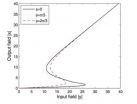(Press-News.org) PHILADELPHIA (June 19, 2014) – We already know haters are predisposed to be that way. Now we see they also spend a lot of time at fewer activities than their non-hater counterparts.
But in a twist of irony, that grumpy person at work may actually be pretty good at their job since they spend so much time on fewer activities, thereby giving them the opportunity to hone their skills in specific tasks.
It's all covered in a new study published in the journal Social Psychology. It seems that a person's "dispositional attitude" – whether the person is a "hater" or a "liker" – plays an important role in his or her activity level.
The article, "Liking more means doing more: Dispositional attitudes predict patterns of general action," is written by Justin Hepler, Department of Psychology, University of Illinois at Urbana-Champaign; and Dolores Albarracín, Annenberg School for Communication and Department of Psychology, University of Pennsylvania. Assuming that our disposition motivates behavior, Hepler and Albarracin suggested that people who like many things (those with positive dispositional attitudes) also do many things during the course of a week, while people who dislike many things (those with low dispositional attitudes) do very few things with their time.
They were right. In two studies, participants reported all of their activities over a one-week period and also completed a measure of dispositional attitudes. Although haters (someone with a low dispositional attitude) and likers (someone with a high dispositional attitude) did not differ in the types of activities they pursued, haters tended to do fewer activities throughout the week than did likers. Nearly 15 percent of the differences in how many activities people conducted during a typical week was associated with being a hater versus a liker.
Haters and likers also did not differ in how much time they spent doing activities throughout the week; they merely differed in the number of activities that they did. As a result, haters spent more time on any given activity than did likers. Thus, compared with likers, haters could be characterized as less active because they do fewer things, or they could be characterized as more focused because they spend more time on the small number of things they do.
"The present results demonstrate that patterns of general action may occur for reasons other than the desire to be active versus inactive," the researchers wrote. "Indeed, some people may be more active than others not because they want to be active per se, but because they identify a large number of specific behaviors in which they want to engage."
Hepler and Albarracín suggest that their findings may have implications for understanding the development of skills and expertise. For example, likers may adopt a jack-of-all-trades approach to life, investing small amounts of time in a wide variety of activities. This would leave them somewhat skilled at many tasks. In contrast, when haters find an activity they actually like, they may invest a larger amount of time in that task, allowing them to develop a higher skill level compared to likers. They said future work should confirm this possibility.
This same pattern could also be relevant to attentional control. For example, likers may have more difficulty sustaining attention on a task because they perceive so many interesting and distracting opportunities in their environment. In contrast, because haters like so few things, they may be unlikely to be distracted when they are doing a task, and thus their generalized dislike may actually benefit their attentional control.
INFORMATION:
Haters spend more time…hating?
U. Illinois/Penn study sheds light on activity levels based on one's attitude disposition
2014-06-19
ELSE PRESS RELEASES FROM THIS DATE:
Criminal profiling technique targets killer diseases
2014-06-19
A mathematical tool used by the Metropolitan Police and FBI has been adapted by researchers at Queen Mary University of London to help control outbreaks of malaria, and has the potential to target other infectious diseases.
In cases of serial crime such as murder or rape, police typically have too many suspects to consider, for example, the Yorkshire Ripper investigation in the UK generated a total of 268,000 names. To help prioritise these investigations, police forces around the world use a technique called geographic profiling, which uses the spatial locations of ...
Humans have been changing Chinese environment for 3,000 years
2014-06-19
For thousands of years, Mother Nature has taken the blame for tremendous human suffering caused by massive flooding along the Yellow River, long known in China as the "River of Sorrow" and "Scourge of the Sons of Han."
Now, new research from Washington University in St. Louis links the river's increasingly deadly floods to a widespread pattern of human-caused environmental degradation and related flood-mitigation efforts that began changing the river's natural flow nearly 3,000 years ago.
"Human intervention in the Chinese environment is relatively massive, remarkably ...
Study: Controllable optical steady behavior obtainable from nonradiation coherence
2014-06-19
A new proposed scheme, by Wen-Xing Yang, from the Department of Physics, Southeast University, China, and colleagues, analyzed in detail the optical steady behavior in GaAs quantum well structure driven by an elliptically polarized field (EPF) in a unidirectional ring cavity.
They show that the controllable optical steady behavior including multi-stability (OM) and optical bistability (OB) can be obtained via nonradiation coherence, and the frequency detuning, cooperation parameter and the amplitude of the EPF. Most interestingly, the conversion between OB and OM can ...
Iconic Minnesota conifers may give way to a more broad-leafed forest in the next century
2014-06-19
Houghton, Mich., June 19, 2014: Over the next 100 years, Minnesota's iconic boreal forest and deep snow may change into a deciduous forest with winters warm enough for some precipitation to fall as rain, according to a new U.S. Forest Service assessment of the vulnerability of Minnesota forests to climate change.
"Minnesota Forest Ecosystem Vulnerability Assessment and Synthesis" was published by the U.S. Forest Service's Northern Research Station and is available online at: http://www.nrs.fs.fed.us/pubs/45939
The assessment describes effects of climate change that ...
The sweetest calculator in the world
2014-06-19
Jena (Germany) In a chemistry lab at the Friedrich Schiller University Jena (Germany): Prof. Dr. Alexander Schiller works at a rectangular plastic board with 384 small wells. The chemist carefully pipets some drops of sugar solution into a row of the tiny reaction vessels. As soon as the fluid has mixed with the contents of the vessels, fluorescence starts in some of the wells. What the Junior Professor for Photonic Materials does here – with his own hands – could also be called in a very simplified way, the 'sweetest computer in the world'. The reason: the sugar molecules ...
Cochrane Review -- Effectiveness of antimicrobial drugs to treat cholera
2014-06-19
Researchers from the Cochrane Infectious Diseases Group, co-ordinated through the editorial base in LSTM, conducted an independent review of the effects of treating cholera with antimicrobial drugs, published in The Cochrane Library today.
Cholera is an acute watery diarrhoea caused by infection with the bacterium Vibrio cholerae, which can cause rapid dehydration and death. Effective treatment requires early diagnosis and rehydration using oral rehydration salts or intravenous fluids. This review looked at the effects of adding antimicrobial drugs to this treatment.
Thirty-nine ...
Synaptic levels of clathrin protein are important for neuronal plasticity
2014-06-19
Researchers of the group of cellular and molecular neurobiology of the Bellvitge Biomedical Research Institute (IDIBELL) and the University of Barcelona, led by researcher Artur Llobet, have shown that synaptic levels of the protein clathrin are a determinant factor for synaptic plasticity of neurons.
Chemical synapses and synaptic vesicular transmission cycle
Neurons transmit information in a specialized contact points called synapses. These structures consist of two elements: the presynaptic one, information donor, and postsynaptic, which receives the information. In ...
Children consuming a Mediterranean diet are 15 percent less likely to be overweight
2014-06-19
A study of 8 European countries presented at this year's European Congress on Obesity (ECO)in Sofia, Bulgaria, shows that children consuming a diet more in line with the rules of the Mediterranean one are 15% less likely to be overweight or obese than those children who do not.
The research is by Dr Gianluca Tognon, University of Gothenburg, Gothenburg, Sweden, and colleagues across the 8 countries: Sweden, Germany, Spain, Italy, Cyprus, Belgium, Estonia and Hungary.
The researchers used data from the IDEFICS study (Identification and Prevention of Dietary – and lifestyle ...
Recreational football reduces high blood pressure in mature women
2014-06-19
The World Cup in Brazil may be attracting a global armchair audience of millions, but new research has shown that playing football could help lower blood pressure in women aged 35-50.
Women within this age group with mild high blood pressure achieve a significant reduction in blood pressure and body fat percentage through playing recreational football for 15 weeks. This is the finding of a new study conducted in a collaboration between researchers across four countries, including Professor Peter Krustrup of the University of Exeter.
The acclaimed Scandinavian Journal ...
MA healthcare reform does not have early impact on disparities in cardiovascular care
2014-06-19
New research by the Brigham and Women's Hospital, in partnership with Howard University College of Medicine, explores the effect of healthcare reform in Massachusetts on coronary intervention and mortality in adults by race/ethnicity, gender and the level of education in the neighborhood where the patient resides.
Published in the June 17, 2014, issue of Circulation, the journal of the American Heart Association, these findings indicate that healthcare reform in Massachusetts has not yet impacted the likelihood of receiving coronary interventions by gender, race/ethnicity ...
LAST 30 PRESS RELEASES:
Hope for global banana farming in genetic discovery
Mirror image pheromones help beetles swipe right
Prenatal lead exposure related to worse cognitive function in adults
Research alert: Understanding substance use across the full spectrum of sexual identity
Pekingese, Shih Tzu and Staffordshire Bull Terrier among twelve dog breeds at risk of serious breathing condition
Selected dog breeds with most breathing trouble identified in new study
Interplay of class and gender may influence social judgments differently between cultures
Pollen counts can be predicted by machine learning models using meteorological data with more than 80% accuracy even a week ahead, for both grass and birch tree pollen, which could be key in effective
Rewriting our understanding of early hominin dispersal to Eurasia
Rising simultaneous wildfire risk compromises international firefighting efforts
Honey bee "dance floors" can be accurately located with a new method, mapping where in the hive forager bees perform waggle dances to signal the location of pollen and nectar for their nestmates
Exercise and nutritional drinks can reduce the need for care in dementia
Michelson Medical Research Foundation awards $750,000 to rising immunology leaders
SfN announces Early Career Policy Ambassadors Class of 2026
Spiritual practices strongly associated with reduced risk for hazardous alcohol and drug use
Novel vaccine protects against C. diff disease and recurrence
An “electrical” circadian clock balances growth between shoots and roots
Largest study of rare skin cancer in Mexican patients shows its more complex than previously thought
Colonists dredged away Sydney’s natural oyster reefs. Now science knows how best to restore them.
Joint and independent associations of gestational diabetes and depression with childhood obesity
Spirituality and harmful or hazardous alcohol and other drug use
New plastic material could solve energy storage challenge, researchers report
Mapping protein production in brain cells yields new insights for brain disease
Exposing a hidden anchor for HIV replication
Can Europe be climate-neutral by 2050? New monitor tracks the pace of the energy transition
Major heart attack study reveals ‘survival paradox’: Frail men at higher risk of death than women despite better treatment
Medicare patients get different stroke care depending on plan, analysis reveals
Polyploidy-induced senescence may drive aging, tissue repair, and cancer risk
Study shows that treating patients with lifestyle medicine may help reduce clinician burnout
Experimental and numerical framework for acoustic streaming prediction in mid-air phased arrays
[Press-News.org] Haters spend more time…hating?U. Illinois/Penn study sheds light on activity levels based on one's attitude disposition





